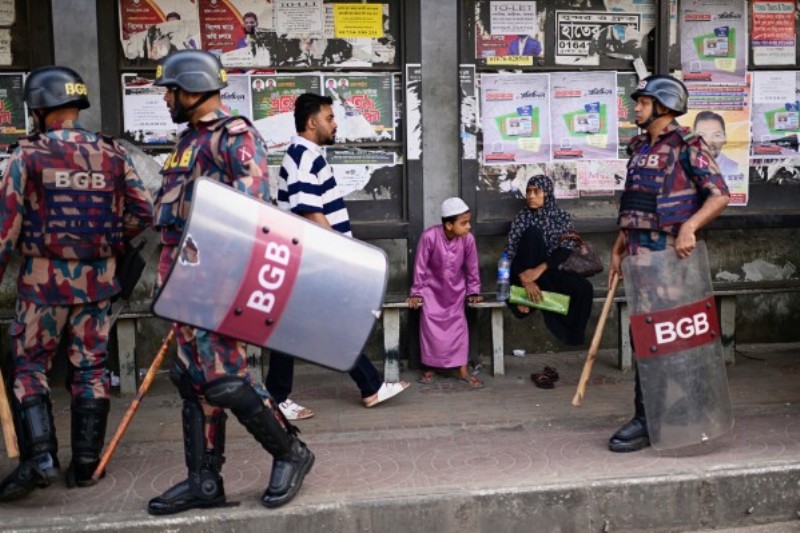By all accounts, the Awami League’s lockdown programme in Dhaka and elsewhere last Thursday has been a success.
It is a measure of how the party has strategically been making its entry back into the political centre. On a day when the unconstitutional Yunus regime planned to decide the date of the ‘verdict’ on Sheikh Hasina for ‘crimes against humanity’ she ‘committed’ in July-August last year, the Awami League clearly made its presence felt.
Citizens stayed in their homes. Public transport was limited. The streets were bereft of the usual hurly-burly of life. Schools hardly had any attendance. The presence of the police and other security personnel all across the capital was reflective of the nervousness the regime felt in its bones.
The fact that Muhammad Yunus addressed the nation in the afternoon and peddled his idea of a referendum on the infamous July Charter and general elections on the same day in February next year made little difference to a citizenry grown weary of illegitimacy compounded by misrule.
The regime and its legal officers have now decreed that the verdict against Sheikh Hasina, who constitutionally remains Bangladesh’s Prime Minister, will be delivered on November 17.
The public feeling is that the verdict has already been made obvious by the public utterances of the regime and its minions in recent months.
Sheikh Hasina could be ‘sentenced to death’. But for a nation which in recent weeks has seen public support for her rise, and not just among Awami League supporters, such a verdict imposed by an illegal court overseen by an equally illegal regime hardly matters.
The sheer nervousness of the regime shows only too well its growing fear of a resurgence of the Awami League in Bangladesh’s politics.
The success of the lockdown has also placed all political parties looking forward to coming by slices of the power cake in February in a quandary.
They have all been surprised, even stunned, by the response of citizens to the Awami League’s call for the lockdown.
In effect, the lockdown was a rejection of the state of politics as it has been pursued by the Yunus regime and the parties that have celebrated the fall of the Awami League from power.
The BNP, Jamaat, and all other parties looking to reap benefits from the changed situation are now clearly perplexed at this new turn of events. That the Awami League matters in national politics has long been known. The lockdown has reconfirmed this reality.
The unabashed hatred for Sheikh Hasina demonstrated by the regime and anti-AL elements notwithstanding, the impetus given to the re-energising of the Awami League through her recent interactions with Western and Indian media has been a major factor in a change in the situation.
The naivete of the regime, in such areas as handling foreign media, was exposed again the other day when the Indian Deputy High Commissioner was summoned to the Foreign Office in Dhaka because the regime was unhappy about Sheikh Hasina’s dealings with the Indian media.
The regime has compelled the Bangladesh media at home into silence, where criticism of its actions is concerned. That it believes foreign governments will do the same with their media, free and independent as they are, stretches credulity.
The Yunus regime is having cold feet these days. With lawyers and legal firms in such countries as the United Kingdom formally complaining to international human rights bodies about the atrocities Awami League activists and, by extension Bangladesh’s citizens have been subjected to since August last year, with lawmakers abroad publicly condemning the misdeeds of the regime, the Yunus outfit has not been sleeping easy. Reports of those associated with it, busy making plans for a safe exit out of the country, have been making the rounds.
The vice chancellor of Dhaka University, appointed to the office through the mob violence unleashed last year, is on course to become the country’s ambassador to Denmark. Some other names of people who are part of the regime have also been mentioned for diplomatic appointments at Bangladesh’s missions abroad.
And the elections planned for February? They appear more as a pipe dream than a practical way of reshaping politics.
If the Awami League can muster the kind of support it demonstrated through its lockdown on Thursday, one will rest content that between now and February, public outrage about a vote which eschews inclusivity through keeping the nation’s largest party out of it will only muddy the waters further.
Yes, elections may be forced on the country in February. But they will be an exercise boycotted by more than fifty percent, perhaps more, of citizens who have been adherents of the Awami League.
That boycott will, from the day after the elections, throw up a new message, which is that the vote will have been a farce that fresh elections under a legally constituted caretaker government are called for.
The success of the lockdown paves the path to new hope about the restoration of the foundational principles of the country.
ALSO READ: Elections in Bangladesh: Between pretence and reality
For the Awami League, the responsibility from here on will be to build on the lockdown as a way of not only restoring its position as the party of past and future government but also taking upon itself the pivotal role of a catalyst in unifying all pro-liberation forces on a single platform. In the coming days and weeks, a rattled Yunus regime will heighten its repressive measures against the Awami League.
For the Awami League, the need will be to ward off the blows, stay the course and make the regime exhausted through the pointlessness of its clearly medieval behaviour.















